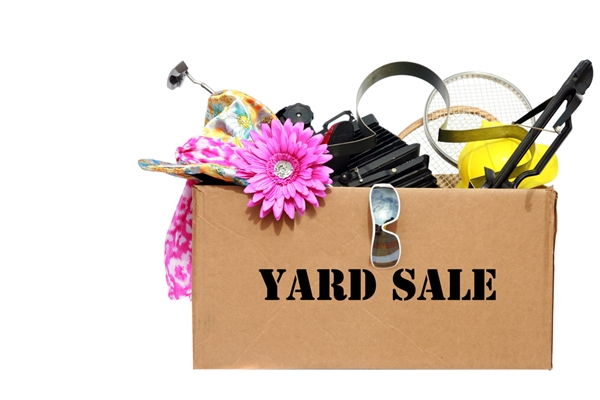'Tis the season for cleanin' – both the inside and outside of your home. From organizing your basement to fixing up the flowerbeds, your tasks my vary. But it usually ends with cleaning out the closets, dusting your light fixtures and decluttering your garage so you can actually park your car in there. Hey, it's called "spring cleaning" for a reason, right?
However, this doesn't have to be a fruitless chore. If you play your cards right, you can turn these tedious tasks into a money-making endeavor. With a little effort, your top-notch organizational skills and a sunny afternoon, you can turn your unwanted belongings into extra cash that you can put toward home renovations or improvements. We're talking about hosting a garage sale, of course! After all, one man's trash is another man's treasure.
A quick tip: To successfully sell your items, put a little effort by making them as attractive as possible. That means washing all the articles of clothing, dusting off old lamps, making sure all electronic devices work, replacing dead batteries, etc.
Select a date, free up some lawn space and channel your inner entrepreneur. Here are spelled tips to hosting a successful garage sale:
1. Spread the word
First things first: You must spread the word. In order to gain from your garage sale, you must make it public knowledge. Consider purchasing an advertisement in the local newspaper and printing out flyers to hang up throughout the neighborhood. You can even take it to the next level and send out invitations to announce your garage sale. Send invites to friends, family, coworkers, and ask everyone to please spread the word. Be sure to include all the dates and times of the event, and the location with detailed directions.
Advertising is huge, so be sure to do it well. If you put some time and effort into making signs that clearly lead to your home, the more customers you'll have. The brighter, the bolder and the bigger your signage is, the better.
2. Round up the troops
Hosting a garage sale can be quite daunting, especially if you try tackling it alone. Ask your kids or some close friends to help out for the weekend. As in incentive, invite them to bring some of their unwanted belongings to sell, too.
3. Consider the setup
Just because you're setting up shop on your front lawn doesn't mean you can't create an inviting ambiance – presentation is key. Rummaging through other people's used clothing or items can be overwhelming, so you want to make it as organized as possible. Arrange items by category and make it easy to maneuver through your setup. Instead of just tossing those classic paperbacks into a box, line them up on the table and sandwich them between book ends for easy browsing. Hang clothing on a drying rack and organize garments by size and style. Create separate sections for toys, jewelry, kitchen items, random tchotchkes and furniture.
Create a welcoming experience for customers by playing some tunes and offering up some lemonade and small appetizers like crackers and cheese.
4. Clearly display the price tag
If customers don't clearly see a price tag, they might try to bargain with you, or lose interest in the item all together. Make it easy on yourself by putting a price tag on each table rather than spending time to put a sticker on each individual item. For bigger items like furniture or floor laps, be sure the price tag is large and visible so customer's aren't searching high and low.
Speaking of price tags, try your best to keep the cost down. Although it's nice to make some extra cash, remember that your ultimate goal is to get rid of all that clutter in your home. A good rule of thumb is to sell things at half of the original price, or consider even lowering it to one-third of the original price. To avoid having to make and carry around loose change (and a calculator), price items with whole numbers.
Items are usually picked over by the end of the run, so implement a mark down as the sun goes down type of deal.
5. Donate the leftovers
You're definitely going to have leftover items – not everything is going to sell. Instead of boxing up all the objects that are just going to sit in your basement for another five years, donate them to a local homeless shelter. Or if you're still trying to earn some extra bucks, bring the remaining items to a Goodwill store. Simply make an itemized list of everything you brought in with its original value, ask for a receipt, and file it away. When tax day rolls around next year, pull out that receipt and use it for "tax deduction for charitable donations." If you couldn't get rid of those big-ticket items like a couch or a TV, consider listing these items on Craigslist.

